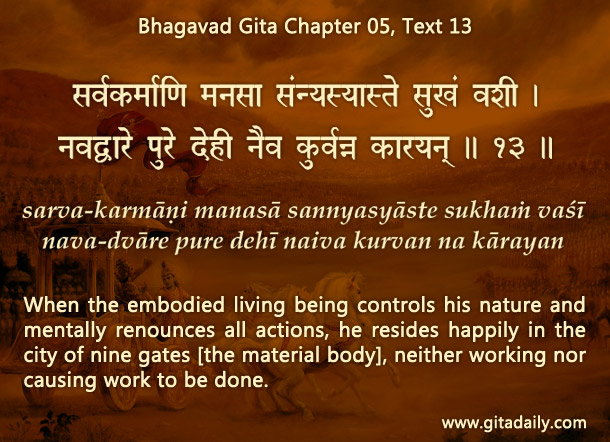“You are not the body” is a basic teaching of the Bhagavad-gita. Even if we understand it, we can’t wish away our bodily incarceration – we have to live in the body lifelong.
To help us balance our bodily and spiritual sides, the Gita (05.13) offers a thought-provoking metaphor of the body as a city of nine gates (nava-dvara puri). When we live in a city, we are concerned about what happens in it, but we don’t misidentify ourselves with it. Similarly, by meditating that the body is our city-like residence, we can view it with concern and distance: as important to us, yet different from us. No wonder the same Gita verse urges us to recognize that most bodily activities are just mechanical functions with which we don’t need to get emotionally involved.
By meditating that the body is our city-like residence, we can view it with concern and distance: as important to us, yet different from us.
If we mentally renounce bodily activities, then that enables us to glimpse our innately joyful spiritual nature. And if we further dedicate our heart and activities to Krishna, then that devotional connection enables us to link with his infinite joyfulness.
We may reside in a city, but we don’t restrict our entire existence to that city alone – we stay emotionally connected with our loved ones who may be residing elsewhere, and often that connection is stronger than our connection with those living physically nearby. Similarly, though we have to sit in the bodily city, we don’t have to stay stuck in it. We don’t have to restrict our aspirations for love and happiness to the body and things connected with it. Krishna is our greatest well-wisher, the person with whom we can have the most emotionally fulfilling connection. And we can deepen that connection by practicing bhakti-yoga, gradually relishing joy unending in eternal love for him.
Explanation of article:
https://www.youtube.com/watch?v=2vU032otb8U


Leave A Comment